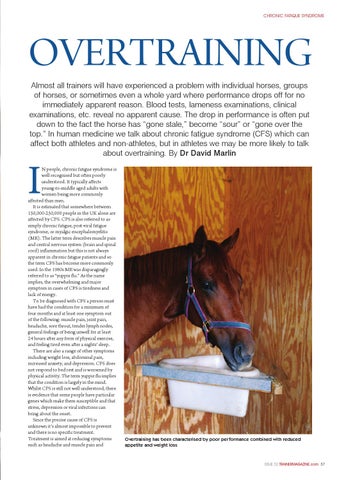fatigue issue 32.qxd:Jerkins feature.qxd
26/11/10
17:56
Page 2
CHRONIC FATIQUE SYNDROME
OVERTRAINING Almost all trainers will have experienced a problem with individual horses, groups of horses, or sometimes even a whole yard where performance drops off for no immediately apparent reason. Blood tests, lameness examinations, clinical examinations, etc. reveal no apparent cause. The drop in performance is often put down to the fact the horse has “gone stale,” become “sour” or “gone over the top.” In human medicine we talk about chronic fatigue syndrome (CFS) which can affect both athletes and non-athletes, but in athletes we may be more likely to talk about overtraining. By Dr David Marlin
I
N people, chronic fatigue syndrome is well recognised but often poorly understood. It typically affects young-to-middle aged adults with women being more commonly affected than men. It is estimated that somewhere between 150,000-250,000 people in the UK alone are affected by CFS. CFS is also referred to as simply chronic fatigue, post-viral fatigue syndrome, or myalgic encephalomyelitis (ME). The latter term describes muscle pain and central nervous system (brain and spinal cord) inflammation but this is not always apparent in chronic fatigue patients and so the term CFS has become more commonly used. In the 1980s ME was disparagingly referred to as “yuppie flu.” As the name implies, the overwhelming and major symptom in cases of CFS is tiredness and lack of energy. To be diagnosed with CFS a person must have had the condition for a minimum of four months and at least one symptom out of the following: muscle pain, joint pain, headache, sore throat, tender lymph nodes, general feelings of being unwell for at least 24 hours after any form of physical exercise, and feeling tired even after a nights’ sleep. There are also a range of other symptoms including weight loss, abdominal pain, increased anxiety, and depression. CFS does not respond to bed rest and is worsened by physical activity. The term yuppie flu implies that the condition is largely in the mind. Whilst CFS is still not well understood, there is evidence that some people have particular genes which make them susceptible and that stress, depression or viral infections can bring about the onset. Since the precise cause of CFS is unknown it’s almost impossible to prevent and there is no specific treatment. Treatment is aimed at reducing symptoms such as headache and muscle pain and
Overtraining has been characterised by poor per formance combined with reduced appetite and weight loss
ISSUE 32 TRAINERMAGAZINE.com 57
